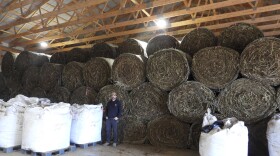As the 20th Century dawned, big business came to the dark tobacco growing region of Kentucky and Tennessee, eliminating competition, manipulating prices and undermining local control. A struggled called The Black Patch War began and lasted nearly until the outbreak of World War I. Commemorations start Friday when the Museums of Historic Hopkinsville-Christian County offer the 3rd Annual Tobacco War Pilgrimage including a raid re-enactment, a tobacco bus tour, a re-enactment of a Trial of the Nightriders and more. Kate Lochte asked Murray State Professor of History Dr. Bill Mulligan to give an overview of the conflict that embroiled this region, starting in 1904.
Dr. Bill Mulligan says the first thing to understand about the Black Patch Wars is that it's a complex series of events, not a single event and not an organized response by a singular group of people under the same leadership. Rather, it's a period of time where a number of issues came to a head in Kentucky.

The initial effort, led by David Amos, was meant to gain more leverage for farmers against the American Tobacco Trust, to reclaim some economic control over their lives. Amos kept a tight focus on group activities, organizing night raids on tobacco warehouses as a means to show the strength of local farmers from Kentucky and Tennessee. The danger of wanting to get control, however, is that anyone who chooses not to help or join the cause becomes a threat to the very existence and survival of those groups. After the Tobacco Trust was declared unconstitutional, Amos left the Princeton area to go to New York to practice medicine. Without his leadership, others used his model of night riding to enforce their own personal agendas.
The events then move into a phase where vigilante violence is directed at people who violate "community social morays," who are perceived as "others." Groups began targeting African Americans, keeping them in their perceived place. Borrowing tactics from the Ku Klux Klan, night riders operated anonymously, wearing masks and camouflaging their horses. Dr. Mulligan says "Once the genie of vigilante violence is let out of the bottle and given social sanction, all kinds of individuals can use it for their own purposes. and that's essentially what happens over time."
Kentucky was one of the richest states in the Union before the Civil War. By 1904, it was one of the poorest. From the Black Patch Wars and feuds like the Hatfields and McCoys, Kentucky fit the narrative in the Northeast newspapers that it was a lawless and violent place. This affected Kentucky's economy, because, as Dr. Mulligan says, "No one in the East is going to invest significant capital in what is perceived to be a lawless, violent society."
Eventually, violence tamped down when local governments begin arresting and prosecuting people. That there became consequences for certain vigilante acts went a long way in stemming the tide. Also, more crop diversification helped reduce the economic pressure on farmers.

Murray State Professor of History Dr. Bill Mulligan recently received a Love of Learning national grant award from The Honor Society of Phi Kappa Phi. The Black Patch War is commemorated this week by events offered by The Museums of Historic Hopkinsville-Christian County. For more, call 270-887-4270.
More about The Tobacco War Pilgrimage
More about The Museums of Historic Hopkinsville-Christian County





